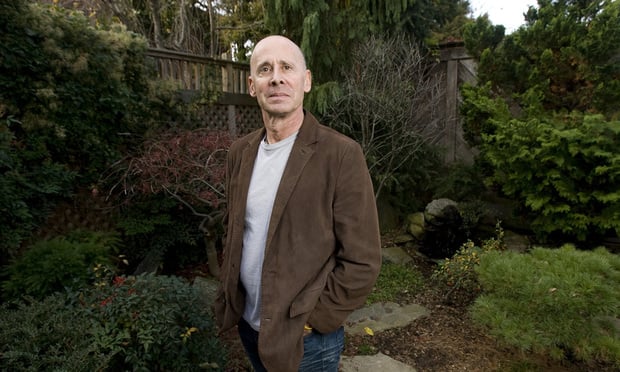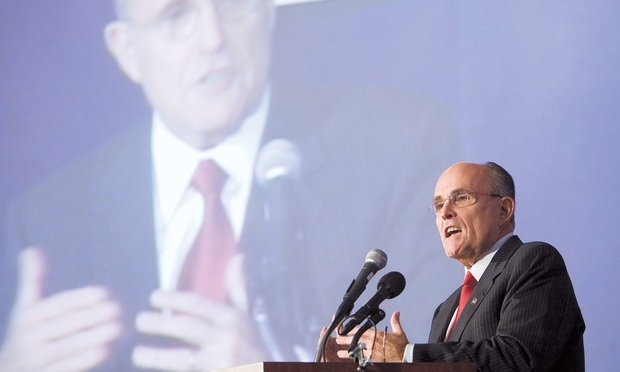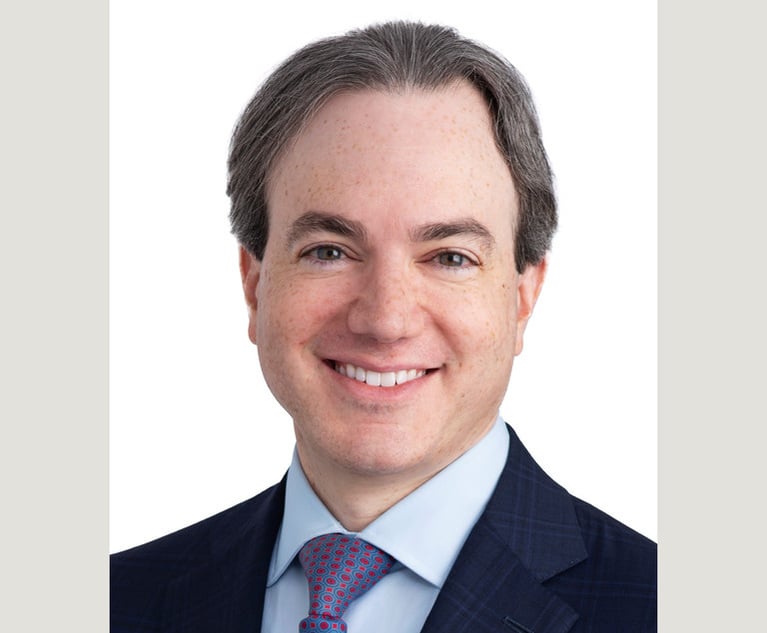'Let's Motor Through, Chairman': How Big Law's Robert Luskin Guided Gordon Sondland
"You've asked this question now three different times. I know you're unhappy with his answer, but if we stay until 7:30 he's not going to change his answer," the veteran Paul Hastings white-collar partner said during one exchange, according to a newly released transcript.
November 05, 2019 at 05:16 PM
6 minute read
The original version of this story was published on National Law Journal
 Robert Luskin/photo by Diego M. Radzinschi/NLJ
Robert Luskin/photo by Diego M. Radzinschi/NLJ
For more than nine hours one Thursday last month, Gordon Sondland, the Trump administration's ambassador to the European Union, spoke with U.S. congressional investigators as part of their impeachment inquiry focused on the president's push to get Ukraine tied up in U.S. electoral politics.
Sondland was one of the "three amigos"—with Rick Perry, the U.S. energy secretary, and Kurt Volker, the former special envoy for Ukraine—participating in the Trump plan to pressure Ukraine to investigate Joe Biden and his son Hunter.
"You kind of liked that nickname," House investigator Daniel Goldman, a former federal prosecutor, asked Sondland at one point during his deposition, a transcript of which was released Tuesday.
"I don't—," Sondland began, before his lawyer, Robert Luskin of Paul Hastings, cut him off.
"We've all heard worse," said Luskin, the veteran white-collar defender in Washington who was on the team that accompanied Sondland for his deposition on Oct. 17. Luskin attended the deposition with Paul Hastings partner Kwame Manley and associate Daniel Holman. They additionally were accompanied by James McDermott from the Portland, Oregon, firm Ball Janik LLP.
Sondland was widely seen as a key witness for House Democrats, who are preparing possible articles of impeachment alleging Trump abused the power of the presidency by enlisting a foreign power to investigate U.S. political rivals. Leading House Democrats have accused Trump of running a "shadow" diplomacy—with the help of his personal lawyer, Rudolph Giuliani—to put a squeeze on Ukraine.
Trump has rejected the assertion his engagement with Ukraine was improper, and he has denied there was a quid pro quo where the resumption of U.S. military aid would be contingent on Ukrainian leaders announcing an anti-corruption investigation involving the Bidens.
Sondland on Monday revised his earlier testimony—through a letter from Luskin and Manley—to acknowledge he delivered a message that U.S. aid would not "likely" occur until the president of Ukraine delivered an anti-corruption message. Sondland said the testimony of other impeachment inquiry witnesses "refreshed" his memory.
Luskin had a few things to state—"housekeeping" matters, as he put it—at the start of Sondland's deposition, the newly released transcript shows. Luskin said Sondland, for instance, was "precluded by law" to produce certain documents the House committee wanted to review.
"But we also wish to emphasize that it's his belief, and ours, that the committee should have access to all relevant documents, and he regrets that they have not been provided in advance of his testimony," Luskin said. "Having those documents would lead to a more fulsome and accurate inquiry into the matters at hand."
During the hourslong deposition, Luskin at times spoke up to assert an answer for Sondland or to ask for additional clarifying information.
 Rudy Giuliani speaks at a Federalist Society convention in Washington in 2007. Credit: Diego M. Radzinschi/ALM
Rudy Giuliani speaks at a Federalist Society convention in Washington in 2007. Credit: Diego M. Radzinschi/ALM"It seems pretty incredible that given that the president directed you guys—the three of you—to address Mr. Giuliani's concerns, that you did nothing to figure out what those concerns are. Is that your testimony?" Goldman asked Sondland at one point. Luskin answered: "No, it's not his testimony."
Sondland asked Goldman then to repeat his question, and Sondland responded: "That wasn't my testimony. My testimony was he said: 'Talk to Rudy.'"
During another exchange, Steve Castor, the top investigator for Republican Jim Jordan of Ohio, was pressing Sondland about text messages involving Ukraine that precipitated him calling up Trump.
"I remember getting a fairly shocking text from Ambassador [William] Taylor where he had alleged in his text that aid was being withheld from Ukraine in return for a political—I'm trying to remember how he phrased it—for political purposes. And—"
When Castor cut off Sondland—"Let me stop you right there"—Luskin interjected: "Let him finish his answer."
Throughout the deposition, there were times Luskin participated in conversations off the record, or where he would declare "we've gone over this ground."
Luskin had his longest public exchange with U.S. Rep. Lee Zeldin, R-New York, who is, like many members of Congress, a lawyer himself. Zeldin was pressing Sondland over his views about Trump pressing Ukraine to investigate the Bidens.
"As I said, I'm not a lawyer. If it's legal for him to do so, then I assume it would be okay. If it's illegal for him to do so, then I assume it would be wrong," Sondland said. "That's the best I can give you. It's really a question of law."
Zeldin said he was trying to reconcile what he described as "two completely different answers" from Sondland.
"With all respect, Congressman, we've now been here for eight and a half hours and Ambassador Sondland has not declined to answer a single question posed by any member or any counsel member," Luskin said. "You've asked this question now three different times. I know you're unhappy with his answer, but if we stay until 7:30 he's not going to change his answer."
Luskin told Zeldin that Sondland "stands by his testimony today, by his answers to your questions and by his answers to the questions by the majority earlier."
He continued: "And I think it's obviously the task of this committee if you perceive there to be any differences between those answers to reconcile those differences. But more questions I don't think are going to assist you any further. I think you've asked it about as many times as you can, and he's given you his best shot at an answer."
Nearing the end of the deposition, Luskin agreed with a plan announced by Democrat Adam Schiff of California, chairman of the intelligence committee. "Good. Let's motor through, chairman."
Read more:
New Lawsuit Alleges Illegal 'Shadow' Ukraine Diplomacy at Trump's Direction
'Get the Job Done': Judge Wants Impeachment Witness Suit Quickly Resolved
Judge Validates Impeachment Inquiry, Orders Mueller Docs Disclosed
'Barely-Lawyered Temper Tantrum': What Lawyers Say About Cipollone's Letter
16 Conservative Lawyers Say They Support 'Expeditious' Impeachment Inquiry
This content has been archived. It is available through our partners, LexisNexis® and Bloomberg Law.
To view this content, please continue to their sites.
Not a Lexis Subscriber?
Subscribe Now
Not a Bloomberg Law Subscriber?
Subscribe Now
NOT FOR REPRINT
© 2025 ALM Global, LLC, All Rights Reserved. Request academic re-use from www.copyright.com. All other uses, submit a request to [email protected]. For more information visit Asset & Logo Licensing.
You Might Like
View All

Houston Law Firm Files $250K Breach of Contract Suit Against 2 Former Lawyers
3 minute read
In Novel Oil and Gas Feud, 5th Circuit Gives Choice of Arbitration Venue
4 minute read
Bill Would Allow Californians to Sue Big Oil for Climate-Linked Wildfires, Floods
3 minute readTrending Stories
- 1ACC CLO Survey Waves Warning Flags for Boards
- 2States Accuse Trump of Thwarting Court's Funding Restoration Order
- 3Microsoft Becomes Latest Tech Company to Face Claims of Stealing Marketing Commissions From Influencers
- 4Coral Gables Attorney Busted for Stalking Lawyer
- 5Trump's DOJ Delays Releasing Jan. 6 FBI Agents List Under Consent Order
Who Got The Work
J. Brugh Lower of Gibbons has entered an appearance for industrial equipment supplier Devco Corporation in a pending trademark infringement lawsuit. The suit, accusing the defendant of selling knock-off Graco products, was filed Dec. 18 in New Jersey District Court by Rivkin Radler on behalf of Graco Inc. and Graco Minnesota. The case, assigned to U.S. District Judge Zahid N. Quraishi, is 3:24-cv-11294, Graco Inc. et al v. Devco Corporation.
Who Got The Work
Rebecca Maller-Stein and Kent A. Yalowitz of Arnold & Porter Kaye Scholer have entered their appearances for Hanaco Venture Capital and its executives, Lior Prosor and David Frankel, in a pending securities lawsuit. The action, filed on Dec. 24 in New York Southern District Court by Zell, Aron & Co. on behalf of Goldeneye Advisors, accuses the defendants of negligently and fraudulently managing the plaintiff's $1 million investment. The case, assigned to U.S. District Judge Vernon S. Broderick, is 1:24-cv-09918, Goldeneye Advisors, LLC v. Hanaco Venture Capital, Ltd. et al.
Who Got The Work
Attorneys from A&O Shearman has stepped in as defense counsel for Toronto-Dominion Bank and other defendants in a pending securities class action. The suit, filed Dec. 11 in New York Southern District Court by Bleichmar Fonti & Auld, accuses the defendants of concealing the bank's 'pervasive' deficiencies in regards to its compliance with the Bank Secrecy Act and the quality of its anti-money laundering controls. The case, assigned to U.S. District Judge Arun Subramanian, is 1:24-cv-09445, Gonzalez v. The Toronto-Dominion Bank et al.
Who Got The Work
Crown Castle International, a Pennsylvania company providing shared communications infrastructure, has turned to Luke D. Wolf of Gordon Rees Scully Mansukhani to fend off a pending breach-of-contract lawsuit. The court action, filed Nov. 25 in Michigan Eastern District Court by Hooper Hathaway PC on behalf of The Town Residences LLC, accuses Crown Castle of failing to transfer approximately $30,000 in utility payments from T-Mobile in breach of a roof-top lease and assignment agreement. The case, assigned to U.S. District Judge Susan K. Declercq, is 2:24-cv-13131, The Town Residences LLC v. T-Mobile US, Inc. et al.
Who Got The Work
Wilfred P. Coronato and Daniel M. Schwartz of McCarter & English have stepped in as defense counsel to Electrolux Home Products Inc. in a pending product liability lawsuit. The court action, filed Nov. 26 in New York Eastern District Court by Poulos Lopiccolo PC and Nagel Rice LLP on behalf of David Stern, alleges that the defendant's refrigerators’ drawers and shelving repeatedly break and fall apart within months after purchase. The case, assigned to U.S. District Judge Joan M. Azrack, is 2:24-cv-08204, Stern v. Electrolux Home Products, Inc.
Featured Firms
Law Offices of Gary Martin Hays & Associates, P.C.
(470) 294-1674
Law Offices of Mark E. Salomone
(857) 444-6468
Smith & Hassler
(713) 739-1250








